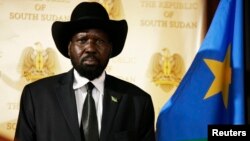JUBA —
South Sudan's President Salva Kiir has withdrawn some powers from his vice president, officials said on Tuesday, clipping the wings of a likely challenger for the ruling party leadership.
Kiir, who has led the Sudan People's Liberation Movement (SPLM) since 2005, also halted a national reconciliation initiative that had been launched by Riak Machar and which had been viewed as an attempt to raise his political profile.
The two men were on opposing sides of a split within the SPLM during much of the 1983-2005 civil war that ended after the two factions reunited.
No major rival parties operate in the country that was formed in 2011 when the south split from Sudan in the north, so the battle for leadership of the SPLM is effectively the race to be president. A national election is due in 2015.
A Western diplomat said Machar had indicated he wanted to compete for leadership of the party, and said this had prompted Kiir to act.
A presidential decree issued on Monday withdrew all powers assigned to Machar that were granted at the discretion of Kiir. Those are aside from functions specifically outlined by the constitution. The decree did not state what powers were removed.
"The vice president of the republic shall be restricted to exercise and discharge only his powers," Kiir's office said in an emailed statement.
James Gatdet Dak, the vice president's press secretary, said they were seeking clarification on the powers withdrawn.
"We don't know which powers yet, they've not specified," Dak told Reuters.
Since landlocked South Sudan gained independence, it has been struggling to assert control over the nation and provide security and basic services to an estimated 11.4 million people.
The country ranks among the least developed countries in the U.N. human development index.
The Western diplomat said the president's decree may have temporarily flattened the aspirations of the vice president.
Aly Verjee, a senior researcher for Nairobi-based think tank the Rift Valley Institute, said Machar had been jockeying for the top job in the party since his an abortive attempt in 2008.
"I don't think Kiir and Machar have ever seen completely eye-to-eye," Verjee said, commenting via email.
"As the memory of independence recedes into the distance, the unity of the SPLM will weaken, and as with other liberation movements, further fracturing of the party is almost certain in the years ahead," he added.
Kiir, who has led the Sudan People's Liberation Movement (SPLM) since 2005, also halted a national reconciliation initiative that had been launched by Riak Machar and which had been viewed as an attempt to raise his political profile.
The two men were on opposing sides of a split within the SPLM during much of the 1983-2005 civil war that ended after the two factions reunited.
No major rival parties operate in the country that was formed in 2011 when the south split from Sudan in the north, so the battle for leadership of the SPLM is effectively the race to be president. A national election is due in 2015.
A Western diplomat said Machar had indicated he wanted to compete for leadership of the party, and said this had prompted Kiir to act.
A presidential decree issued on Monday withdrew all powers assigned to Machar that were granted at the discretion of Kiir. Those are aside from functions specifically outlined by the constitution. The decree did not state what powers were removed.
"The vice president of the republic shall be restricted to exercise and discharge only his powers," Kiir's office said in an emailed statement.
James Gatdet Dak, the vice president's press secretary, said they were seeking clarification on the powers withdrawn.
"We don't know which powers yet, they've not specified," Dak told Reuters.
Since landlocked South Sudan gained independence, it has been struggling to assert control over the nation and provide security and basic services to an estimated 11.4 million people.
The country ranks among the least developed countries in the U.N. human development index.
The Western diplomat said the president's decree may have temporarily flattened the aspirations of the vice president.
Aly Verjee, a senior researcher for Nairobi-based think tank the Rift Valley Institute, said Machar had been jockeying for the top job in the party since his an abortive attempt in 2008.
"I don't think Kiir and Machar have ever seen completely eye-to-eye," Verjee said, commenting via email.
"As the memory of independence recedes into the distance, the unity of the SPLM will weaken, and as with other liberation movements, further fracturing of the party is almost certain in the years ahead," he added.





